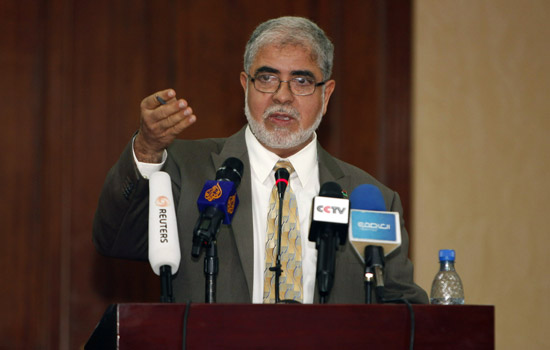By Michel Cousins and George Grant.

Tripoli and London, 20 September:
Mustafa Abushagur will submit his chosen cabinet on 30 September to the . . .[restrict]General National Congress for approval.
The Prime Minister-elect made the announcement yesterday evening via Twitter.
Abushagur has been holding a series of meetings with party leaders and other stakeholders in the past few days, having declared his intention to form a government of national unity.
Speculation as to who will fill the posts has been growing, but it is expected that any cabinet will reflect choices acceptable to a broad range of political opinion in the Congress, and will also contain figures from all main Libyan towns and regions.
Abushagur, who narrowly beat National Forces Alliance leader Mahmoud Jibril to the premiership on 12 September, has allowed few details to be leaked to the public.
It has been reported, however, that all but two members of the existing government will lose their jobs, the exceptions being Electricity Minister Awad Barasi, and Labour Minister Mustafa Rujbani.
If true, the decision will come as a major shock, particularly as it would mean the replacement of Abdulrahman Ben Yezza as Minister of Oil. Ben Yezza has been widely hailed as a competent pair of hands at the Oil Ministry, one of the most vital in Libya, and he is known to be popular locally and with international oil companies.
The reported decision to keep Barasi is much less of a surprise. A member of the Muslim Brotherhood, the current electricity minister was the favoured candidate of the Islamists in the race for prime minister.
For several weeks in the run-up to the election, Barasi was considered Abushagur’s main rival for the prime ministership, but he was knocked out of the first round of voting by Mahmoud Jibril, a late entrant to the race.
A deal between Abushagur and Barasi is believed to have been made, with the majority of the latter’s votes going to the deputy prime minister in the second round, enabling him to narrowly secure victory over Jibril.
Barasi has, moreover, spoken in the past of his desire to stay on at the Electricity Ministry to “finish the job”.
Rujbani staying at the Labour Ministry is more of a surprise although he himself is reported as saying that he has been asked to stay on.
As for the NFA leader himself, it remains to be seen whether he will join the new government or not. On Tuesday, Jibril said that the alliance would be prepared to work with the government if it was genuinely in the national interest, but that he would not be part any government just for the sake of appearances.
“This is not a matter of just a patching-up job”, Jibril said. “If there is a national role, then the NFA will not hesitate to participate in a beneficial national programme, but if the alliance is only needed to make up numbers, or to show off, then I would say no, because the NFA made an agreement and a pledge to the Libyan people, which we have an obligation to fulfil.”
Jibril concluded by saying that to work with the government for any purpose other than that would “just be a waste of time”.
Another name that has been mentioned as a possible contender is Abdul Hakim Belhaj, who unsuccessfully stood for election to the National Congress in July. It is being reported that he will be offered the post of Interior Minister.
His prior tenure as head of the Tripoli Military Council earned him plaudits in some quarters, and his name was being put forward as a candidate for the post of Interior Minister even before the elections.
The current Interior Minister, Fawzi Abdelal, has been mired in controversy over his handling of the desecration of Sufi shrines last month, and his department’s handling of last week’s fatal assault on the US consulate in Benghazi. Having temporarily tendered his resignation following the Shrine attacks, Abdelal is almost certain to lose his job.
Nevertheless, some political watchers see the appointment of Belhaj as replacement as unlikely. Of all Libya’s high-profile political figures, Belhaj is the one who was most comprehensively rejected by the electorate.
The Wattan party, of which he was a leading member, failed to garner a single seat in the National Congress elections, despite predictions of major success and despite spending a small fortune on publicity.
Two other names that have also been mentioned as possible candidates are Khaled Al-Sayeh, who has been tipped for the Defence Minister’s job, and Ibrahim Jibril for the post of Minister of Communications.
Sayeh, a lawyer by training, previously served as a member of the NTC for Benghazi and, earlier, as a coordinator between ground forces and the NTC during the revolution, as well as a spokesman for General Abdel Fateh Younes, the commander of revolutionary forces prior to his death last July.
Little is known about Ibrahim Jibril, hitherto a writer and political activist.
Mindful of the need to accommodate local interests and concerns, Abushagur is also rumoured to be considering the appointment of a series of deputy ministers from Libya’s numerous regions.
According to a prior decision of the National Congress, no senior government post, including those of defence minister, interior minister and foreign minister, can be filled by a sitting Congressman or woman.
As with the post of prime minister, the ministers of defence, interior and foreign policy cannot hold dual nationality and their spouses must also be Libyan. [/restrict]








